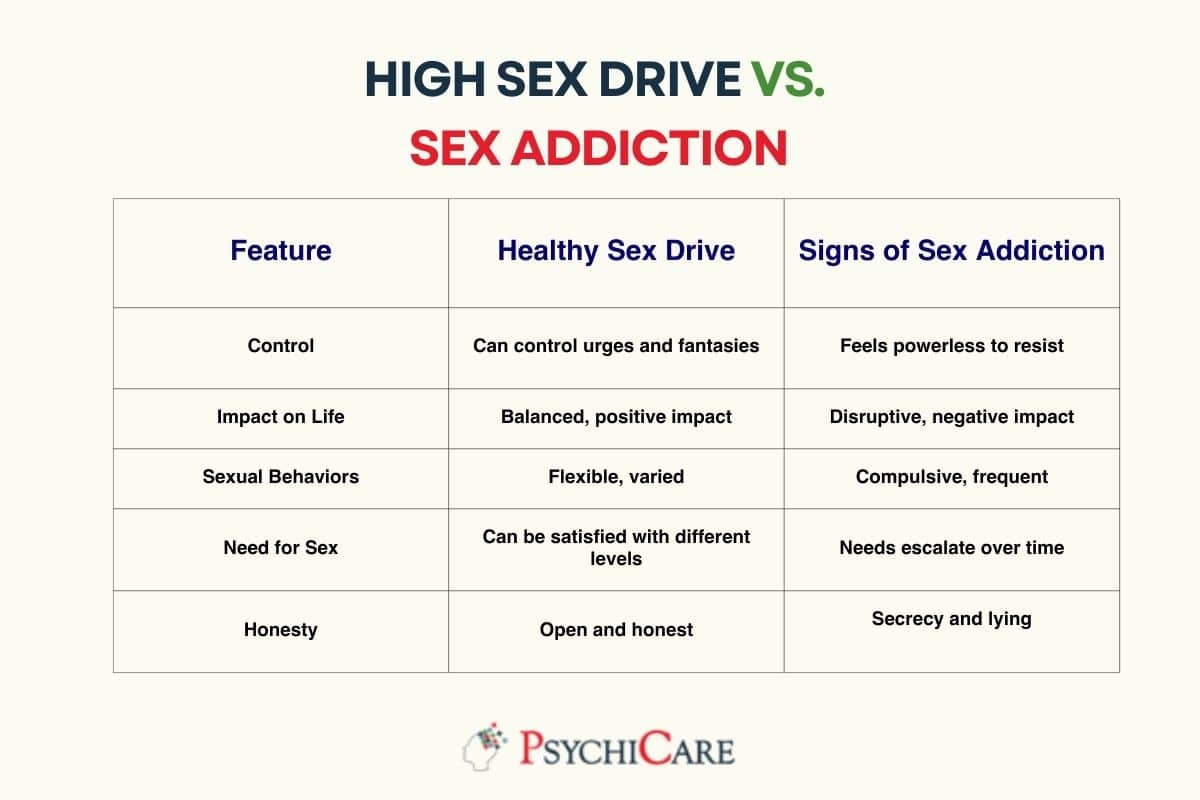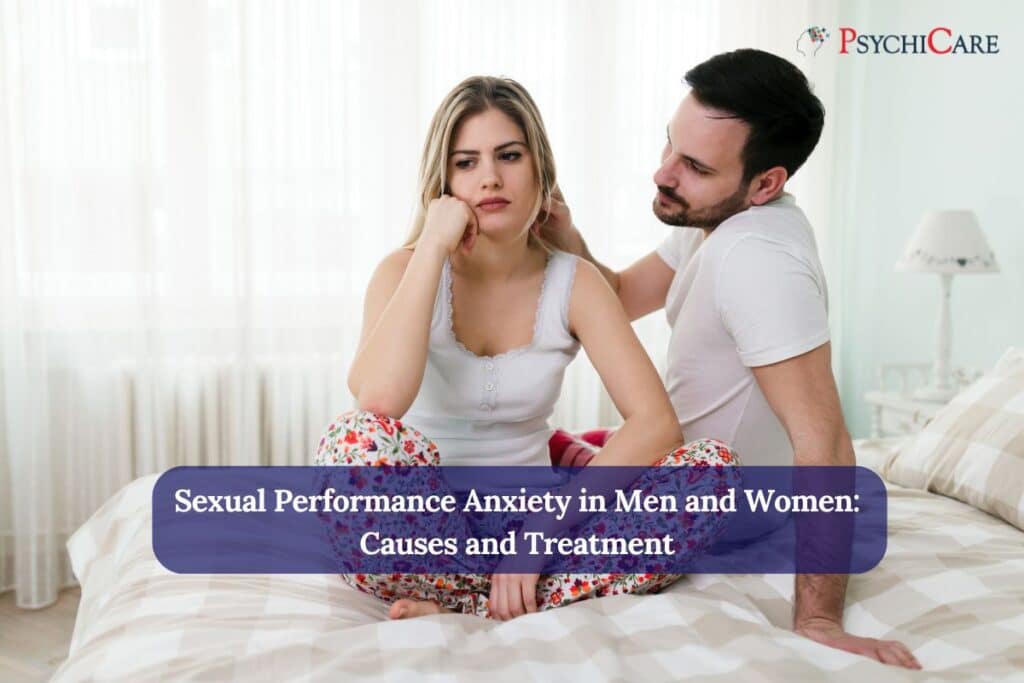We all have sexual thoughts and desires, and for some people, those urges can feel especially strong. Having a high sex drive on its own is not a problem and it does not automatically mean something is wrong with you. Yet many people begin to worry when they feel unable to stop thinking about sex, struggle to control their urges, or notice their behavior affecting their relationships, work, or emotional well-being.
This is where confusion often sets in. Am I just highly sexual, or is this a sign of sex addiction? The difference is not about how often you think about sex, but about control, distress, and impact on your life.
In this article, we’ll help you understand the difference between a mismatched or high sex drive and sex addiction, explain the signs that may indicate a deeper issue, and guide you on when it might be helpful to seek professional support, without shame, labels, or judgment.
High Sex Drive vs Sex Addiction: What’s the Real Difference?
It’s easy to assume that thinking about sex often or wanting it frequently means something is wrong. In reality, a high sex drive and sex addiction are not the same thing, even though they’re often confused.
The difference is not how strong your desire is, but how much control you have and how it affects your life.
High Sex Drive
A high sex drive means you experience strong or frequent sexual desire, but you are still in control of your thoughts and actions.
Common signs include:
- Strong sexual interest that feels enjoyable, not distressing
- Ability to choose when and how you act on sexual urges
- Sexual activity that does not interfere with work, relationships, or daily responsibilities
- No persistent guilt, shame, or secrecy around sexual behavior
- Interest in hobbies, relationships, and goals beyond sex
A high sex drive can be influenced by hormones, age, emotional connection, health, or life stage, and it does not require treatment unless it causes distress.
Sex Addiction (Compulsive Sexual Behavior)
Sex addiction is not about desire alone. It’s about loss of control.
It may be a concern when:
- Sexual thoughts feel intrusive or obsessive
- You repeatedly act on sexual urges despite negative consequences
- You feel unable to stop or cut back, even when you want to
- Sexual behavior begins to affect relationships, work, finances, or mental health
- Sex is used mainly to cope with stress, loneliness, anxiety, or emotional pain
- Feelings of shame, secrecy, or regret follow sexual behavior
In sex addiction, sex stops being a choice and starts feeling like a compulsion.
A Simple Way to Tell the Difference
Ask yourself:
- Can I stop when I want to?
- Do I feel in control, or do my urges control me?
- Is my sexual behavior adding to my life, or taking away from it?
If your sexual desire feels manageable and aligned with your values, it’s more likely a high sex drive.
If it feels overwhelming, distressing, or damaging, it may be time to explore support.
What Is Sex Addiction?
Sex addiction, also known as hypersexuality or compulsive sexual behavior, isn’t just about having a high sex drive. We all have those, and that’s totally normal! But sex addiction becomes a problem when your thoughts and urges about sex become overwhelming and you can’t control them. It’s like your brain gets stuck on a loop, constantly thinking about sex, even when it starts causing issues in your life.
Here’s the key difference: a healthy sex drive feels good and adds to your life. Sex addiction, on the other hand, can feel stressful and make things harder in work, relationships, and even how you feel about yourself. These urges can manifest in various ways, including:
- Compulsive pornography use
- Frequent masturbation
- Constant sexual fantasies
- In some cases, it can lead to risky sexual behaviors.
What Are the Signs and Symptoms of Sex Addiction?
Sex addiction, also called compulsive sexual behavior, shows up in different ways for different people. The common thread is loss of control and negative impact, not how often someone thinks about sex.
Constant Preoccupation With Sex
Sexual thoughts may feel intrusive and difficult to switch off. You might find it hard to concentrate on work, conversations, or daily tasks because your mind keeps returning to sexual fantasies, urges, or online content.
Loss of Control Over Sexual Urges
A key sign of sex addiction is repeatedly engaging in sexual behavior even after deciding to stop. You may promise yourself it’s the last time, yet feel unable to resist the urge when it returns.
Compulsive Sexual Behaviors
This may include excessive pornography use, frequent masturbation, or seeking sexual encounters in a way that feels driven rather than chosen. Sexual behavior may begin to take priority over responsibilities, rest, or relationships.

Emotional Distress After Sexual Behavior
Instead of feeling satisfied, you may experience guilt, shame, anxiety, or emotional emptiness after sexual activity. These feelings can then trigger further urges, creating a difficult cycle.
Relationship Difficulties
Sex addiction can affect emotional intimacy and trust. You may withdraw from your partner, hide behaviors, or engage in actions that damage the relationship, leading to conflict, distance, or loneliness.
Escalation Over Time
Over time, you may need more intense, risky, or extreme sexual experiences to feel the same level of relief or satisfaction. This escalation often increases emotional and real-life consequences.
Neglecting Responsibilities
Work, studies, family responsibilities, personal health, or self-care may start to suffer as sexual behavior takes up more mental and emotional space.
Financial or Practical Consequences
Spending excessive money on sexual content, subscriptions, services, or related activities can lead to financial stress, secrecy, or debt.
Secrecy, Lying, or Hiding Behavior
Many people struggling with sex addiction hide their behavior due to fear, shame, or guilt. This secrecy often deepens emotional isolation and relationship strain.
Important Note
Having one or two of these experiences occasionally does not automatically mean you have a sex addiction. What matters is pattern, persistence, loss of control, and impact on your life.
What Causes Sex Addiction?
The exact causes of sex addiction are still being explored, but researchers believe it’s likely a complex interplay of various factors. Here’s a breakdown of some potential causes of sex addiction:

Biological Factors
Brain chemistry and differences in neurotransmitters, particularly dopamine, might play a role. Dopamine is associated with pleasure and reward, and some individuals with sex addiction may have a neurological predisposition to seeking intense pleasure or struggling with impulse control.
Psychological Factors
A history of trauma, abuse, or neglect can contribute to compulsive sexual behaviors as a coping mechanism. Early negative experiences can lead to a distorted view of intimacy and sexuality, making someone more susceptible to using sex to numb difficult emotions.
Mental Health Conditions
Sex addiction can co-occur with other mental health conditions like anxiety, depression, or ADHD. These conditions can create emotional distress that individuals may try to manage through compulsive sexual behaviors. For example, someone with anxiety might use sex as a temporary escape from anxious feelings.
Social and Cultural Factors
Exposure to pornography at a young age, societal pressures around sex, or difficulty forming healthy relationships can all be contributing factors. Unrealistically portrayed sex in pornography can create distorted expectations and dissatisfaction with normal sexual experiences. Additionally, social pressures around masculinity or femininity can lead some individuals to use sex to validate their self-worth or feel accepted.
10 Signs Of A Possible Sex Addiction.
- Excessive phone use for pornography or sexting
- Frequent unplanned sexual encounters
- Withdrawing from social activities due to preoccupation with sex
- Unexplained financial strain due to sex-related spending
- Lying or secrecy about sexual behavior
- Deteriorating relationships due to lack of intimacy or neglect
- Neglected personal hygiene or appearance
- Loss of interest in hobbies or activities
- Feelings of shame or guilt after sexual encounters
- Feeling powerless to resist sexual urges
What Are The Treatments For Sex Addiction?
Sex addiction, though challenging, is absolutely treatable. There are several effective approaches that can help you overcome compulsive sexual behaviors and build a healthier relationship with sex. Let’s explore some common treatment options:
Psychotherapy
Psychotherapy is a form of therapy that can be highly effective in treating sex addiction. It provides a safe space to explore the underlying issues contributing to your compulsive behaviors and develop healthier coping mechanisms. Here are some specific types of psychotherapy that can be beneficial:
Cognitive-behavioral therapy (CBT):
CBT is a form of therapy that helps identify and change unhealthy thought patterns and behaviors related to sex. Through CBT, you can learn skills to manage cravings, resist urges, and develop healthier coping mechanisms.

Psychodynamic therapy:
This type of therapy focuses on exploring the underlying emotional roots of sex addiction. This could involve looking at past traumas, attachment issues, or early experiences that might be contributing to your current behavior. By understanding these emotions, you can develop healthier ways to deal with them and break free from compulsive patterns.
Couples therapy:
If your sex addiction has impacted your relationship, couples therapy can be a crucial part of the healing process. It can help you and your partner rebuild trust, improve communication skills, and establish healthy boundaries around sex.
Medication (in some cases)
While there’s no medication specifically approved for sex addiction, medication might be helpful in some cases. If you have co-occurring mental health conditions like depression or anxiety that contribute to your sex addiction, a doctor may prescribe medication to manage those symptoms.
Are Symptoms Of Compulsive Sexual Behavior The Same For Everyone?
Sex addiction can be tricky. You might wonder if everyone experiences it the same way. Here’s the thing: they don’t!
Some people have sex on their mind all the time, like a bright light. Others might only have these thoughts sometimes, like a dim glow.
There are many reasons why someone might struggle with sex addiction. Someone who’s been through something tough might use sex to feel better, while another person might be influenced by what they see online. These different reasons can lead to different signs.
Everyone is unique, with their own way of dealing with things and their own relationships. This means sex addiction can look different from person to person. For example, someone might hide their behavior completely, while another might be more open about it but have trouble keeping healthy relationships.
How Do I Find A Sex Therapist?
Here are a few ways to find a qualified sex therapist in your area:
- Search online for “sex therapist near me” or chat with your doctor. They might know someone good!
- Websites like AASECT have therapist listings you can search through.
- PsychiCare connects you with sex therapists. you can see their qualifications and even choose a male or female therapist!
How To Differentiate High Sex Drive From Signs Of Sex Addiction
Certainly! Here are the key points differentiating high sex drive from sex addiction:
High Sex Drive
- Strong but manageable sexual desire.
- Does not interfere with daily life, relationships, or responsibilities.
- Engages in sexual activity within a healthy, consensual context.
- Can control sexual urges and behaviors.
- Does not lead to significant distress or negative consequences.
- Enjoys a variety of activities outside of sexual experiences.
Sex Addiction
- Inability to control sexual urges and behaviors.
- Obsessive thinking about sex, interfering with daily life.
- Engages in sexual activities despite negative consequences (e.g., relationship issues, health risks, legal problems).
- Significant impairment in personal, social, or occupational functioning.
- Uses sex primarily to cope with stress, anxiety, depression, or other negative emotions.
- Needs increasingly risky or intense sexual experiences for satisfaction.
- Often involves secretive behaviors and feelings of guilt or shame after sexual activities.

Why Is My Sex Drive So High?
Biological Factors
- Hormonal Levels: Higher testosterone can increase sex drive.
- Age: Younger individuals often have higher libido.
- Health and Fitness: Good health and exercise boost libido.
Psychological Factors
- Mental Health: Positive mental health enhances sexual desire.
- Emotional Connection: Satisfying relationships increase sex drive.
- Self-Esteem: High self-esteem boosts libido.
Lifestyle Factors
- Diet: Balanced diet influences libido positively.
- Sleep: Adequate rest maintains hormonal balance.
- Substance Use: Moderate alcohol may increase sex drive.
Emotional Factors
- Stress Relief: Sex as a way to relieve stress.
- Emotional Fulfillment: Desire for intimacy and closeness.
- Novelty: New relationships heighten sexual desire.
- Exploration: Discovering sexuality increases sex drive.
What Are The Side Effects Of Not Having Sex In Man?
Not having sex can have various side effects for men, including potential impacts on prostate health, erectile function, and immune function. Psychologically, it might lead to increased stress, decreased mood, lower self-esteem, and feelings of loneliness. Socially, it can strain relationships and lead to a sense of isolation. Additionally, men might miss out on the cardiovascular and sleep benefits that regular sexual activity provides.
Could Biological Factors Contribute to Men’s Sexual Addiction?
Yes, biological factors can contribute to men’s sexual addiction. Hormonal imbalances, such as high testosterone levels, and neurotransmitter activity, like dopamine and serotonin imbalances, can affect reward and pleasure centers in the brain. Genetic predisposition and structural differences in brain areas responsible for impulse control and reward can also play a role.
Do Psychological Factors Play a Role in Sexual Addiction for Women?
Yes, psychological factors play a significant role in sexual addiction for women. Trauma, particularly sexual abuse, can lead to compulsive sexual behaviors, as can mood disorders like depression and anxiety. Unhealthy thought patterns about sex and low self-esteem contribute, as do stress and poor coping mechanisms. Relationship dynamics, attachment issues, and societal influences also play a part.
FAQs About Sex Addiction and Sexual Urges
Am I addicted to sex?
Sex addiction is not defined by how often you think about sex, but by loss of control and negative impact. If sexual urges feel overwhelming, difficult to stop, and are affecting your relationships, work, or emotional health, it may be worth speaking with a professional for clarity.
Is having a high sex drive the same as sex addiction?
No. A high sex drive involves strong sexual desire that remains manageable and within your control. Sex addiction involves compulsive behavior, distress, and continued actions despite harmful consequences.
Why do I keep thinking about sex all the time?
Persistent sexual thoughts can be influenced by stress, anxiety, hormones, emotional needs, boredom, or frequent exposure to sexual content. When these thoughts feel intrusive or disruptive, it may signal an underlying emotional or behavioral issue.
Is uncontrollable horniness normal?
Occasional strong sexual urges can be normal. However, if the urge feels constant, distressing, or impossible to control, and leads to regret or problems, it may be a sign of compulsive sexual behavior.
Can sex really be addictive?
Sex itself is not considered addictive in the same way as substances. However, the behavioral patterns around sex can become compulsive, especially when sex is used to cope with emotional pain, stress, or loneliness.
How do I know when to seek help?
You may benefit from professional support if:
You feel unable to control sexual urges
Sexual behavior causes guilt, shame, or secrecy
Relationships or work are being affected
You rely on sex to escape emotional distress
Seeking help is not a sign of weakness, it’s a step toward balance and well-being.
Can sex addiction be treated?
Yes. Sex addiction is treatable through therapy, especially approaches like cognitive-behavioral therapy, psychodynamic therapy, and couples therapy when relationships are involved. Treatment focuses on understanding triggers, building control, and developing healthier coping strategies.





